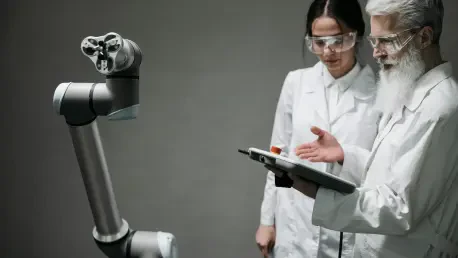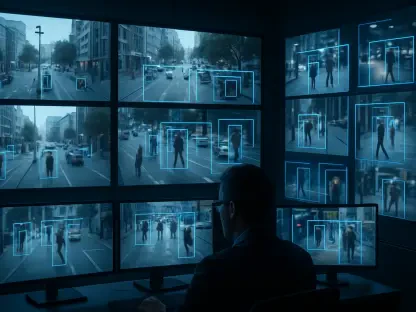In the fast-evolving world of legal technology, a groundbreaking collaboration between two innovative companies, Juro and Wordsmith, is setting a new standard for how in-house legal teams tackle their daily challenges. This partnership harnesses the power of artificial intelligence (AI) to streamline complex workflows, blending Juro’s deep expertise in contract lifecycle management (CLM) with Wordsmith’s dynamic AI-driven workspace. Far from a typical merger or competitive standoff, this alliance prioritizes seamless integration to deliver enhanced efficiency and a superior user experience. By focusing on the unique pain points of fragmented tools and sluggish processes that often plague legal departments, the collaboration promises to redefine operational norms. The use of cutting-edge technology like the Model Context Protocol (MCP) further underscores the forward-thinking nature of this union, positioning it as a potential catalyst for broader industry change. As legal tech continues to adapt to rising demands for automation and connectivity, this partnership offers a glimpse into a future where collaboration trumps rivalry, and client needs drive innovation.
Unveiling the Key Players in Legal Tech
Juro emerges as a leader in the legal tech arena with its intelligent contracting platform, catering to over 550 clients worldwide. Specializing in contract workflows, the company provides a centralized repository for contracts, acting as a reliable system of record. Its AI-powered tools facilitate contract review and data extraction, enabling in-house legal teams to streamline operations significantly. What sets Juro apart is its commitment to empowering business teams to self-serve within strict legal parameters, reducing dependency on legal staff for routine tasks. This targeted approach ensures that contract management becomes less of a bottleneck and more of a strategic asset for organizations navigating complex agreements.
Wordsmith, in contrast, carves out its niche as an AI workspace designed specifically for in-house legal teams, having recently secured $25 million in funding to fuel its growth. Unlike Juro’s narrow focus on contracts, Wordsmith offers a broader, flexible environment where AI agents autonomously plan and orchestrate workflows across diverse legal tasks. This capability allows for the efficient handling of multi-step processes, pulling together various components to complete assignments with minimal human intervention. The platform’s emphasis on dynamic automation positions it as a versatile tool for legal departments seeking to modernize operations beyond just contract management, addressing a wide array of operational needs with precision and speed.
Harnessing Complementary Strengths for Impact
The essence of the partnership between Juro and Wordsmith lies in its focus on complementary integration rather than direct competition. While both companies operate within the legal tech space, their distinct strengths—Juro’s robust CLM system and Wordsmith’s AI orchestration—combine to form a more holistic solution for clients. This approach avoids the pitfalls of forcing users into a single, monolithic platform, instead allowing them to benefit from specialized tools that work in harmony. By integrating their systems, the partnership ensures that in-house legal teams can access Juro’s contract expertise alongside Wordsmith’s workflow automation, creating a synergy that enhances overall productivity without redundancy.
At the core of this integration is the innovative Model Context Protocol (MCP), a technological framework that acts as a seamless connector between the two AI applications. MCP enables Wordsmith’s AI agents to interact with documents stored in Juro’s repository at critical junctures in a workflow, such as retrieving a specific contract during a review process. This level of interoperability surpasses traditional integration methods like webhooks, offering a fluid and flexible exchange of data. The result is a smoother user experience where tasks flow naturally between platforms, eliminating the friction often associated with disparate systems and setting a new benchmark for how legal tech tools can collaborate effectively.
Empowering In-House Legal Teams with Purpose
A driving force behind this partnership is the shared mission of Juro and Wordsmith to empower in-house legal teams facing mounting pressures to do more with limited resources. Legal departments often grapple with disjointed tech stacks that hinder efficiency and slow down critical processes. By combining their platforms, the two companies aim to address these challenges head-on, creating a unified environment where workflows are faster and more intuitive. This integration not only benefits legal professionals by automating repetitive tasks but also allows business units to handle routine matters under predefined legal guidelines, fostering collaboration across departments.
Beyond just solving technical issues, the alliance reflects a deeper understanding of the unique needs of in-house counsel in today’s fast-paced corporate landscape. The focus is on delivering practical tools that reduce operational silos and enhance decision-making capabilities. For instance, the ability to seamlessly transition between contract management in Juro and broader task orchestration in Wordsmith means that legal teams can maintain oversight while delegating non-critical activities. This strategic alignment underscores a commitment to transforming how legal work is conducted, prioritizing agility and responsiveness in an environment where time is often of the essence.
Prioritizing Client Value Through Seamless Solutions
Client value sits at the forefront of this collaboration, with both Juro and Wordsmith dedicated to enhancing the user experience through their integrated offerings. For Juro’s customers, the partnership means access to Wordsmith’s dynamic workflow capabilities, allowing them to incorporate advanced automation into their existing contract processes. Conversely, Wordsmith’s users can tap into Juro’s specialized contract repository and AI tools, ensuring that their broader legal tasks are grounded in a reliable system of record. This mutual benefit approach minimizes friction and builds trust among legal and business teams alike, focusing on practical outcomes over strategic market positioning.
Moreover, the emphasis on client-centric delivery extends to reducing the complexity often associated with adopting new technologies. By ensuring that their platforms work together seamlessly, Juro and Wordsmith lower the barriers to entry for in-house teams looking to modernize their operations. The integration means that users don’t need to overhaul their existing systems or learn entirely new tools from scratch. Instead, they can leverage familiar interfaces while gaining the advantages of enhanced functionality, making the transition to AI-driven workflows less daunting and more aligned with real-world needs, ultimately fostering greater confidence in adopting innovative solutions.
Championing an Open Ecosystem for Legal Tech
A notable aspect of this partnership is the commitment of both Juro and Wordsmith to openness within the broader legal tech ecosystem. Juro has been actively expanding its infrastructure to interface with external platforms, such as Slack or even ChatGPT, reflecting a willingness to operate beyond isolated silos. Similarly, Wordsmith is developing multiple integrations, ensuring that its unique features, like multi-document processing, can be utilized within other systems. This trend toward interconnected solutions marks a departure from the traditionally fragmented nature of legal tech, where tools often functioned in isolation, creating inefficiencies for end users.
This openness is not just a technical stance but a strategic one, recognizing that in-house legal teams often rely on a diverse array of tools to manage their workloads. By fostering compatibility with other platforms, Juro and Wordsmith position themselves as enablers of a more cohesive tech stack, where data and processes can flow freely across applications. Such an approach not only enhances the value of their own offerings but also encourages a collaborative spirit within the industry, potentially inspiring other companies to adopt similar integrative frameworks and further breaking down barriers that have long hindered comprehensive legal tech adoption.
Driving Industry Trends Through AI and Collaboration
The alliance between Juro and Wordsmith mirrors broader trends in legal tech, particularly the shift toward collaborative ecosystems and the widespread adoption of AI. Both companies acknowledge that no single provider can address every client need, choosing instead to excel in their respective domains—CLM for Juro and AI orchestration for Wordsmith—while integrating with complementary tools. This mindset challenges the conventional drive to build all-encompassing solutions internally, suggesting that specialization paired with connectivity offers a more sustainable path forward for meeting diverse user demands in a fragmented market.
Additionally, the partnership highlights the transformative potential of AI when embedded within practical, user-focused workflows. By combining their AI capabilities, Juro and Wordsmith are not just automating tasks but reshaping how legal teams approach their responsibilities, from contract management to complex operational challenges. This focus on actionable AI implementation could serve as a model for other legal tech providers, encouraging a wave of partnerships that prioritize integration and specialization over direct competition, ultimately accelerating the industry’s evolution toward more efficient and interconnected solutions.
Elevating User Experience as a Core Mission
At its heart, this collaboration is about redefining user experience for in-house legal teams navigating an increasingly complex technological landscape. By embedding AI into familiar workflows and ensuring seamless integration between their platforms, Juro and Wordsmith address the growing demand for tools that are both intuitive and effective. The partnership eliminates the need for users to juggle multiple disconnected systems, instead providing a unified interface where contract management and broader legal tasks coexist effortlessly, reducing operational friction and enhancing overall satisfaction.
This emphasis on user experience aligns with a larger industry movement to design solutions that prioritize practicality over mere innovation for its own sake. Legal departments often face resistance to adopting new tools due to steep learning curves or compatibility issues, but the integrated approach of Juro and Wordsmith mitigates these concerns by focusing on ease of use. The result is a set of tools that not only meet technical requirements but also resonate with the day-to-day realities of legal work, ensuring that technology serves as an enabler rather than a barrier, and setting a high standard for what client-focused legal tech should achieve.
Shaping the Future of Legal Tech Innovation
Reflecting on the strides made by Juro and Wordsmith, their partnership marks a pivotal moment in legal tech by demonstrating the power of collaboration over rivalry. The integration of Juro’s contract expertise with Wordsmith’s AI-driven orchestration delivers tangible benefits for in-house legal teams, addressing long-standing inefficiencies with a unified solution. The pioneering use of MCP as a bridge between platforms stands out as a technical achievement, offering a blueprint for future integrations across the sector.
Looking ahead, the success of this alliance suggests actionable next steps for the industry, such as exploring deeper integrations or developing joint AI features tailored to evolving client needs. Legal tech providers might consider adopting similar collaborative models, focusing on interoperability to build a more connected ecosystem. For in-house teams, the takeaway is clear: seek out solutions that prioritize seamless functionality and user experience, ensuring technology adapts to their workflows rather than the other way around. This partnership lays the groundwork for a future where innovation in legal tech is defined by synergy and practicality.









